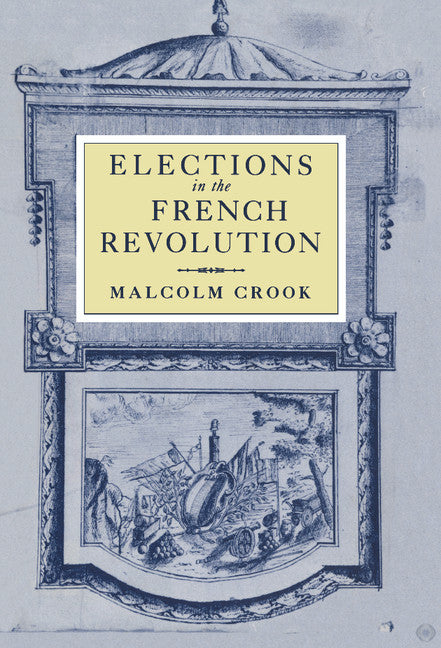Freshly Printed - allow 8 days lead
Couldn't load pickup availability
Elections in the French Revolution
An Apprenticeship in Democracy, 1789–1799
An exploration of the role of elections in the French Revolution based on extensive research in different regions of France.
Malcolm Crook (Author)
9780521451918, Cambridge University Press
Hardback, published 7 March 1996
236 pages, 5 maps 20 tables
22.9 x 15.2 x 1.4 cm, 0.49 kg
"I have no hesitation in saying that Malcolm Crook's Elections in the French Revolution is one of the half-dozen most important books on the French Revolution to appear in English in the past twenty-five years....Any academic library that offers any support at any official or unofficial, formal or informal level of study of the French Revolution must make available to its clientele this extremely important, well-written, and thoroughly and imaginatively researched book, for its impact will long be essential." History
This book explores the vital but neglected issue of elections in the French Revolution. Based on extensive research in different regions of France, it is the only general survey to examine the full range of local and national contests, from the Estates General to the advent of Napoleon. Focusing on electoral behaviour, it reveals a fascinating experiment with a quasi-universal suffrage, which established enduring features of French elections. The retention of the traditional practice of voting in assemblies, and a refusal to acknowledge candidates, canvassing and competing political parties, inhibited the emergence of a pluralistic electoral culture. Nonetheless, frequent polling offered unprecedented political opportunities to millions. This revolutionary apprenticeship in democracy left a lasting imprint on the development of modern French citizenship.
Introduction
1. Subjects to citizens? The elections to the Estates General and the Revolution
2. The limits of citizenship: the Franchise question, 1789–91
3. Biting on the ballot: from enthusiasm to abstention, 1790–1
4. One man one vote? The experiment with electoral democracy in 1792
5. Voting the constitution: the referenda of 1793 and 1795
6. Parties, schisms and purges: elections under the Directory, 1795–9
7. An invisible aristocracy? The departmental assemblies and the emergence of a new political class
Conclusion.
Subject Areas: Modern history to 20th century: c 1700 to c 1900 [HBLL], European history [HBJD]


